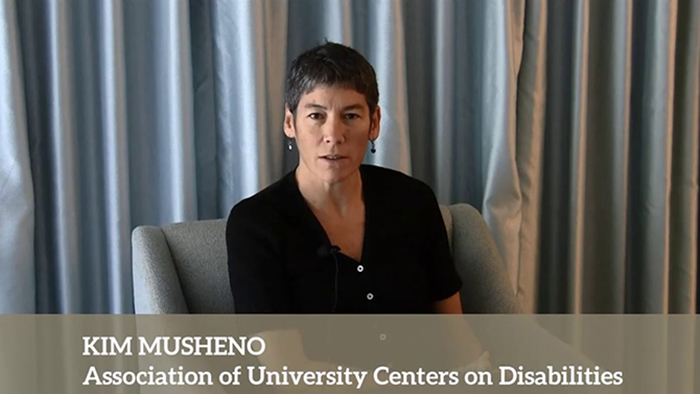
AUCD Assists NH-LEND Trainees with Lifespan Respite Care Research
Kim Musheno, Director of Public Policy at the Association of University Centers on Disabilities (AUCD), recently discussed the Lifespan Respite Care Reauthorization Act of 2015 (H.R. 3913) with 23 trainees from the New Hampshire Leadership Education in Neurodevelopmental and Related Disabilities (LEND) Program (NH-LEND) at the University of New Hampshire and the University of Maine.
Musheno has worked in the field of disability policy for nearly two decades. She’s monitored or worked on nearly every major piece of legislation that affects people with developmental disabilities and their families, including the Developmental Disabilities Act, the Individuals with Disabilities Education Act, Rehabilitation Act, Americans with Disabilities Act, the Work Incentives Improvement Act, Combating Autism Act, and legislation to reform Medicaid such as the Family Opportunity Act, Money Follows the Person Act, Community First Choice Act, and most recently, the Patient Protection and Affordable Care Act.
The NH-LEND trainees are collaborating on a policy brief to help educate their respective congressional delegations and build bipartisan support for the reauthorization of the Lifespan Respite Care Program. Enacted in 2006, it provides competitive grants to states to establish or enhance statewide Lifespan Respite systems to ensure quality respite is available for family caregivers of children and adults of all ages with special needs.
The preparation of policy briefs and attendance at the annual Disability Policy Seminar in Washington, DC are key components of the LEND policy assignment each spring.
AUCD is one of over 50 national organizations, representing all ages and disabilities, to sign on to a letter of support to bill co-sponsors, Representative Jim Langevin (D-RI) and Representative Gregg Harper (R-MS). The letter cites recent research from the AARP Public Policy Institute:
“Forty-three million family caregivers provide a vast majority of our nation’s long-term care, permitting individuals to remain in their communities and avoid or delay nursing home or foster care placements. AARP has estimated that family caregivers provide $470 billion in uncompensated care annually, a staggering statistic that exceeds annual federal and state spending on Medicaid health services and long-term services and supports.” (Source: Valuing the Invaluable: 2015 Update, AARP Public Policy Institute)
The Association of University Centers on Disabilities works to advance policy and practice to improve the health, education, social, and economic well-being of all people with disabilities and their families. They support over 100 university and hospital-based member centers across the United States.
